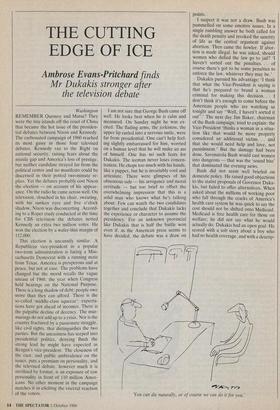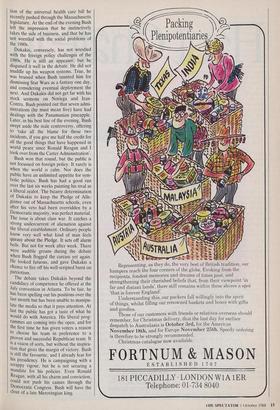THE CUTTING EDGE OF ICE
Ambrose Evans-Pritchard finds Mr Dukakis stronger after the television debate
Washington REMEMBER Quemoy and Matsu? They were the tiny islands off the coast of China that became the hot issue of the presiden- tial debates between Nixon and Kennedy. The carbonated campaign of 1960 reached its most gassy in those four televised debates. Kennedy ran to the Right on national security, raising fears about the missile gap and America'S loss of prestige, but neither candidate strayed far from the political centre and no manifesto could be discerned in their potted two-minute re- plies. Yet the debateS probably cost Nixon the election — on account of his apPear- ance. On the radio he came across well. On television, slouched in his chair, sweating, with his sunken eyes and five o'clock shadow, Nixon was disconcerting. Accord- ing to a Roper study conducted at the time for CBS television the debates netted Kennedy an extra two million votes. He won the election by a wafer-thin margin of 112,000.
This election is uncannily similar., A Republican vice-president in a popular two-term administration is facing a Mas- sachusetts Democrat with a running mate from Texas. America is prosperous and at peace, but not at ease. The problems have changed but the mood recalls the vague unease of 1960, the year when Congress held hearings on the National Purpose. There is a long shadoiv of debt: people owe more than they can afford. There is the so-called 'middle-class squeeze': expecta- tions have got ahead of incomes. There is the palpable decline of decency. The mur- murings do not add up to a crisis. Nor is the country fractured by a passionate struggle, like civil rights, that distinguishes the two parties. But the uneasiness has seeped into presidential politics, denying Bush the strong lead he might have expected as Reagan's vice-president. The closeness of the race, and public ambivalence on the issues, puts a premium on perSonality, and the televised debate, however much it is sterilised by format, is an exposure of raw personality in front of 110 million Amer- iCans. No other moment in the campaign matches it in eliciting the visceral reaction of the voters.
I am not sure that George Bush came off well. He looks best when he is calm and measured. On Sunday night he was ex- cited. The flailing arms, the jerkiness; the upper lip curled into a nervous smile, were far from presidential. One can't help feel- ing slightly embarrassed for him, worried on a human level that he will make an ass of himself. One has no such fears for Dukakis. The iceman never loSes concen- tration. He chops too much with his hands, like a puppet, but he is invariably cool and articulate. There were glimpses of his obnoxious side — his arrogance and 'bora! certitude — but too brief to offset the overwhelming impression that this is a solid man who knows what he's talking about. Few can watch the two candidates together and conclude that Dukakis lacks the experience or character to assume the presidency. For an unknown provincial like Dukakis that is half the battle won even if, as the American press seems to have decided, the debate was a draw on
points.
I suspect it was not a draw. Bush was pummelled on some emotive issues. In a single rambling, answer he both called for the death penalty and invoked the sanctity of life as the central argument against abortion. Then came the howler. If abor- tion is made illegal, he was asked, should women who defied the law go to jail? 'I haven't sorted out the penalties. . . of course there's got to be some penalties to enforce the law, whatever they may be.'
Dukakis pursued his advantage: 'I think that what the Vice-President is saying is that he's prepared to brand a woman criminal for making this decision. . . I don't think it's enough to come before the American people who are watching us tonight and say "Well, I haven't sorted it out".' The next day Jim Baker, chairman of the Bush campaign, tried to explain: the Vice-President 'thinks a woman in a situa- tion like that would be more properly considered an' additional victim. . . and that. she would need help and love, not punishment.' But the damage had been done. Savonarola Bush would cast women into dungeons — that was the 'sound bite' that dominated the evening news.
Bush did riot seem well briefed on domestic policy. He raised good objections to the statist proposals of Governor Duka- kis, but failed to offer alternatives. When asked about the millions of working pOoi who fall through the cracks of America's health care system he was quick to say the cost should not be shifted onto Medicaid. Medicaid is free health care for those on welfare; he did not say what he would actually do. Dukakis had an open goal. He scored with a sob story about a boy who had no health coverage, and with a descrip-
'You can die naturally, or of course we can do it for yoU.'
tion of the universal health care bill he recently pushed through the Massachusetts legislature. At the end of the evening Bush left the impression that he instinctively takes the side of business, and that he has not wrestled with the social problems of the 1980s.
Dukakis, conversely, has not wrestled with the foreign policy challenges of the 1980s. He is still an appeaser; but he disguised it well in the debate. He did not muddle up his weapon systems. True, he was bruised when Bush taunted him for dismissing Star Wars as a fantasy one day, and considering eventual deployment the next. And Dukakis did not get far with his stock sermons on Noriega and Iran- Contra. Bush pointed out that seven admi- nistrations (he must mean five) have had dealings with the Panamanian pineapple. Later, in his best line of the evening, Bush swept aside the stale controversy, offering to 'take all the blame for those two incidents, if you give me half the credit for all the good things that have happened in world peace since Ronald Reagan and I took over from the Carter Administration'.
Bush won that round, but the public is not focussed on foreign policy. It rarely is when the world is calm. Nor does the public have an unlimited appetite for sym- bolic politics. Bush has had a good run over the last six weeks painting his rival as a liberal zealot. The bizarre determination of Dukakis to keep the Pledge of Alle- giance out of Massachusetts schools, even after his veto had been overridden by a Democratic majority, was perfect material. The issue is about class war. It catches a strong undercurrent of alienation against the liberal establishment. Ordinary people know very well what kind of man feels queasy about the Pledge. It sets off alarm bells. But not for week after week. There were audible groans during the debate When Bush flogged the carcass yet again. He looked fatuous, and gave Dukakis a chance to fire off his well-scripted burst on patriotism.
The debate takes Dukakis beyond the candidacy of competence he offered at the July convention in Atlanta. To be fair, he has been spelling out his positions over the last month but has been unable to manipu- late the media so that it pays attention. At last the public has got a taste of what he would do with America. His liberal prog- rammes are coming into the open, and for the first time he has given voters a reason to choose his team in preference to a proven and successful Republican team. It is a vision of sorts, but without the inspira- tion that gives the margin of victory. Bush is still the favourite, and I already fear for his presidency. He is campaigning with a scrappy vigour, but he is not securing a mandate for his policies. Even Ronald Reagan, with all his charm and conviction, could not push his causes through the Democratic Congress. Bush will have the clout of a late Merovingian king.



































































 Previous page
Previous page